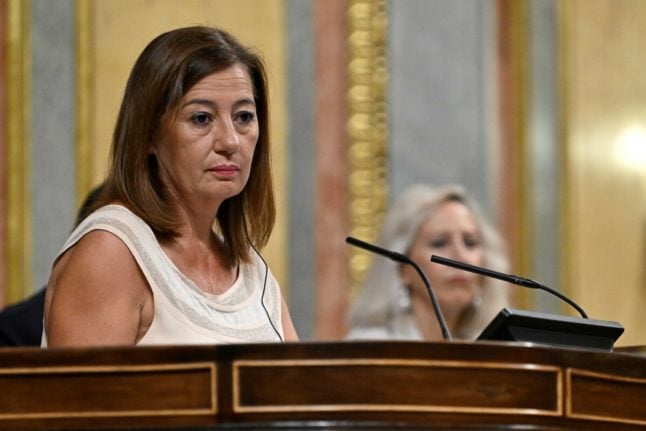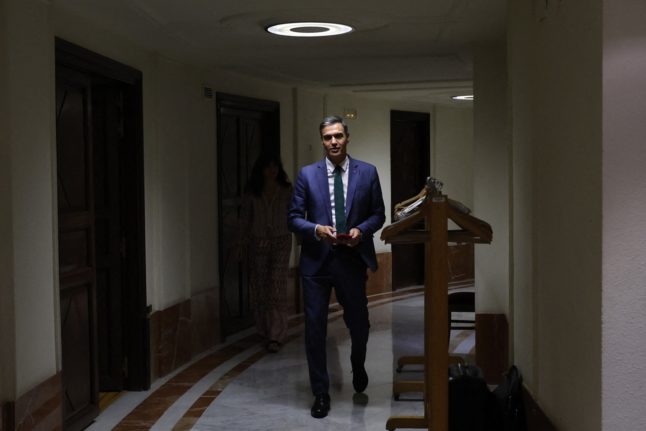The plot thickens in Spain’s pandemic corruption scandal.
Francina Armengol, Speaker of Spain’s House of Deputies, is facing calls to resign her post for her alleged involvement in the ‘Caso Koldo’, as it’s become known.
The scandal broke following the arrest of Koldo García, a one-time advisor to Spain’s former Transport Minister José Luis Ábalos for alleged corruption and ‘kickbacks’ in the awarding of contracts for face masks during the Covid-19 pandemic.
Spain’s Civil Guard police then arrested around twenty people and carried out property searches across the country, with crimes of criminal organisation, money laundering, bribery and influence peddling all suspected.
The case has dominated the Spanish news cycle since and threatened to destabilise the government as it negotiates its controversial amnesty law for Catalan separatists.
READ ALSO: What is Spain’s ‘Caso Koldo’ corruption scandal all about?
In the immediate aftermath of the scandal, Ábalos, who was not only a former Minister but a key political player within the governing Socialist party (PSOE), bore the brunt of the political pressure.
But now Francina Armengol, who was only elected Speaker in August 2023, is facing calls to resign. The Speaker is effectively the third most powerful position within the Spanish state, after the King and Prime Minister.
At the time Armengol’s candidacy for speaker was widely viewed as a political choice by Prime Minister Pedro Sánchez to appeal to Catalans as proceeded with the amnesty law. Armengol was President of the Balearic Islands and is a Mallorquí speaker, a Catalan dialect spoken on the islands.
On Sunday Miguel Tellado, spokesman for the Partido Popular (PP) group in Spain’s Congress, announced that his party would call for Armengol’s immediate resignation, he claims, “for her obvious involvement” in the Koldo case.
“Everything points to the fact that she collaborated in the plot and tried to deceive the EU by asking them to assume the cost of this scam,” Tellado said, adding that Armengol should resign as soon as possible because “she has played with the money, health and intelligence of the Spanish people.”
Armengol is implicated in the scandal because she was President of Balearic Islands during the pandemic when a contract for masks was signed with Soluciones de Gestión SL, the company implicated in the Caso Koldo, for €3.7 million.
In 2023, while she was still the regional President, the Balearic government then claimed €2.6 million from the company for having received defective masks.
However, Spanish outlet La Sexta reports that Armengol’s regional administration took almost three years to formally complain to the company about the masks.
The defective masks were reportedly received at the end of March 2020. However, it was not until March 2023, almost three years later, when the regional health service complained to Soluciones de Gestión SL.
As of Monday March 4th, Tellado confirmed in a press conference that the PP had formally submitted their request for Armengol’s resignation in writing.
However, voices on the Spanish left have come to Armengol’s defence. Aina Vidal, a deputy for junior coalition partner Sumar and leader of En Comú Podem, has accused the PP of wanting to “take advantage” of the Caso Koldo for political reasons.
“The Partido Popular is acting in a rather nefarious way. They are not judges, nor is this a spectacle, or a kind of theatre scene. This is Congress, at the end of the day… things have to be respectful and have to work well,” Vidal said.
The PP’s pressure on Armengol follows over a week of intense attacks on Ábalos, and forms part of a political strategy to tie allegations of corruption to the government, and Prime Minister Pedro Sánchez, more broadly.
For Tellado and others on the Spanish right, the Koldo case is actually Sánchez case: “This is not the Koldo case, this is not the Ábalos case, this is the Sánchez case, because all those involved are people who are extremely close to the Prime Minister, and they are people who are directly linked to him,” he claimed.



 Please whitelist us to continue reading.
Please whitelist us to continue reading.
Member comments